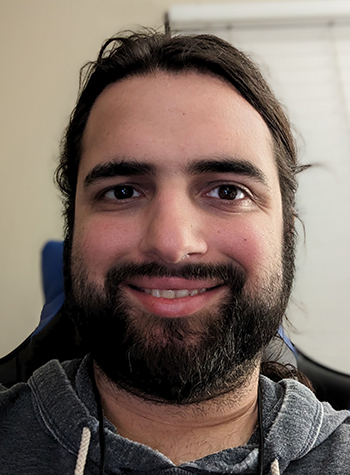Benjamin, Computer Science

Growing up, I had a high school that didn’t really know how to accommodate—and the frustrations of this eventually led me to dropping out. In the years since, I’ve been able to redirect frustration toward something constructive. I got my GED, and I went back and spent a couple of years at a community college doing physics and math and other coursework. I transferred to Purdue University and was able to join a group working on combining machine learning and distributed systems with visualization. I got my bachelor’s in computer science and used that to jump to NYU, where I did my master’s in Computer Science.
One of my frustrations with school was all the standardized testing. It doesn’t necessarily map up with individuals’ unique abilities. For example, with my ADD, a multiple-choice, standardized calculus test was definitely not the way for me to do well. I did better in classes that were smaller and where the teacher went through my work. A difficulty more related to my hearing was that, as an undergrad, I started out using a CART (Communication Access Real-time Translation) service, which is like real-time captioning. The people who perform those services are not necessarily people initiated into the specialized field that you’re learning about, so it’s really hard to translate in real time.
Another challenge of navigating my education was deciding whether or not I could be upfront and say, “‘These are the things I need” and communicate with people about problems—and still have their respect at the end of the day. You see a subtle reaction when you start talking about accommodations with certain people. Some people are thrilled to try to equalize the field, and others are like, “This is unfair for everybody else.” So it definitely enters into the equation as to whether or not you’re willing to show your cards. You don’t want to work with people who aren’t willing to meet you halfway, but you’re also pruning your possibilities if you say you’re not going to deal with those people. In a perfect, equalized world, nobody would have to make that trade-off. And over the years I got more comfortable with being upfront and finding people I could trust to ask, “Hey, what did that guy say?” or “I missed that, can you give me a summary?”
“Neurodiversity to me is really just about bringing together a bunch of people who have minds that work differently. … I think it’s important to bring together different people—not necessarily just neurodiverse people—and put them together in a room and say, ‘OK, how do we solve problems?’”
- Benjamin
I’m currently working on machine learning and graphics research and development. Ever since I realized that doing research on building new cool things is a real career possibility, that has been a guiding principle. Basically, I’m looking at how to apply machine learning to visual effects (VFX) to make it easier for VFX artists to make things in a natural, intuitive way.
I also collaborated on starting a business, a lab spinoff from NYU with technology that we were working on there. We tried the business for a couple of years, and it didn’t work out. It’s partly the nature of startups, but the pandemic was really the X-factor that changed everything. What we were trying to do [involved people working in the same space] using augmented/virtual reality. Then the pandemic happened and nobody was in the same room anymore.
I may do another startup, but one thing that came out of the experience is that I’m much more interested in the science part of it than I am the business side of it. As we were ending it, it was very clear that academic work and research is more important to me.
So my goal is to keep doing research in some form. Whether that‘s with a Ph.D. or doing startups, I want to keep doing something new. … It’s kind of weird for me to say I’m an outside-the-box thinker, but that’s what other people would likely say about me. I think one of my strengths is bringing a different perspective to the table.
I would say that I’ve had more failures than successes in the grand scheme of things, but all you really need is one or two big wins to offset all the losses. I’m thinking a lot about this stuff now because I have a family and a little girl. I ask myself, “How do I mentor her?” I also ask, “What would the 16-year-old me need to hear?” Maybe this: Take frustration and do something useful with it. Find a problem and fix it.